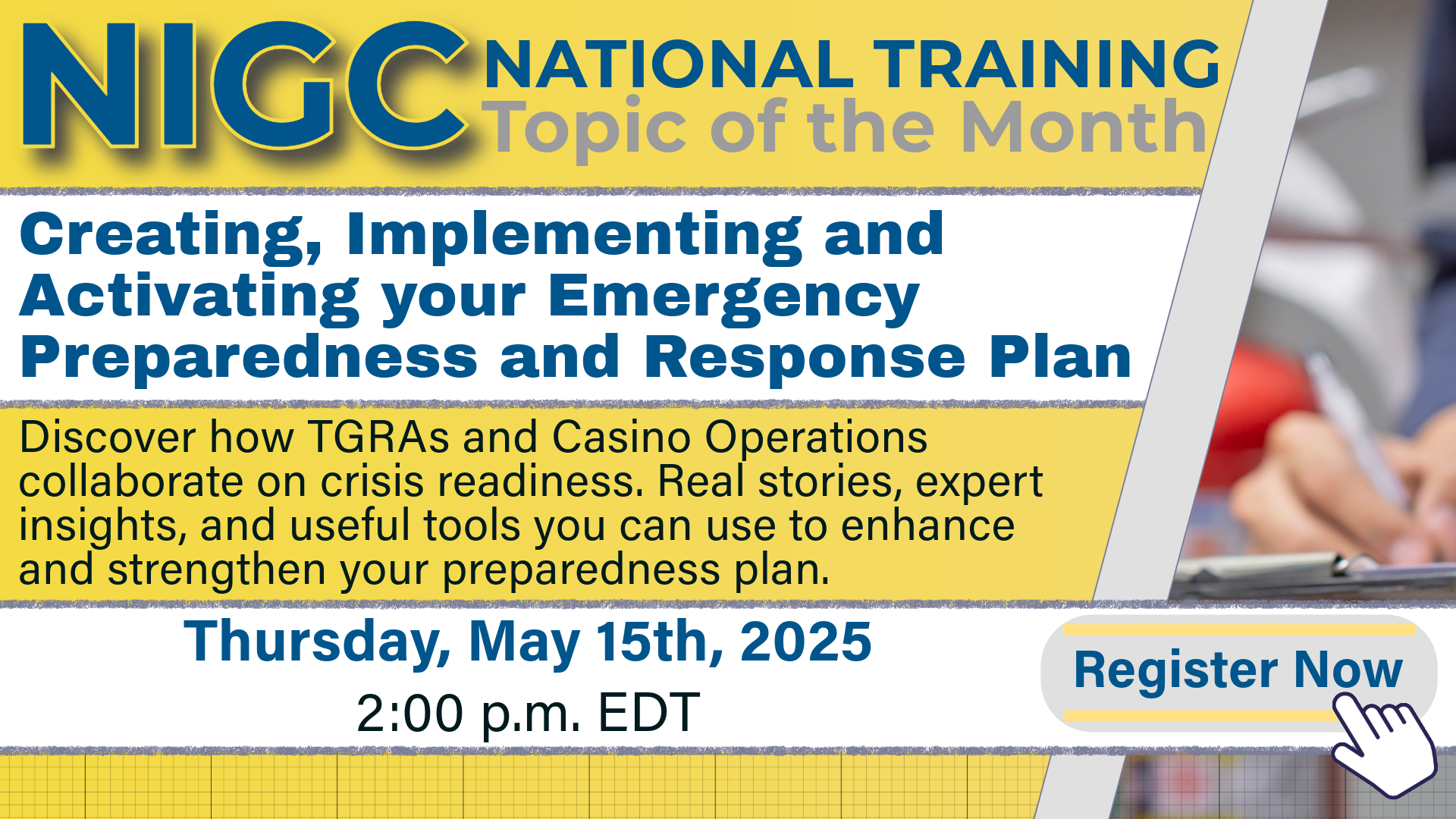| Date | Publication Number | Title | Topic |
|---|---|---|---|
| 11/18/2004 | No. 2004-2 | Indian Gaming Working Group | Govnmt to Govnmt Tribal-NIGC Consultations |
Indian Gaming Working Group
Date: 2004
Subject: Indian Gaming Working Group
“With the commission of this working group, we are sending a strong message that any cheats, scams and frauds will be investigated and prosecuted to the fullest extent of the law. In addition, we ask for cooperation from anyone who knows of illegal activities taking place at your or any other Indian casinos throughout the country by contacting the local FBI offices, the NIGC’s Region Offices, or the appropriate <?XML:NAMESPACE PREFIX = ST1 />
Indian gaming revenues have grown from $100 million in 1988 when the Indian Gaming Regulatory Act (IGRA) was enacted, to $16.7 billion in 2003. Currently, approximately 350 Indian gaming related operations are being conducted by over 220 tribes in 29 states. While this phenomenal growth has been an economic boon to many Native American tribes, it has unfortunately also made Indian gaming an attractive target for criminal groups attempting to profit from embezzlement, illegal betting, and other criminal activities. The tribes themselves have the primary day-to-day responsibility of keeping their facilities honest and fair for both players and operators. In fulfilling their responsibilities, tribal officials, gaming commissioners, and law enforcement personnel should be particularly vigilant for any indications of corrupting criminal influences known to be attracted to cash-intensive industries such as gaming. As a result of the rapid expansion of Indian gaming it has also become incumbent on the federal agencies to find ways to be more effective in keeping Indian casinos crime free.
One of the primary missions of the National Indian Gaming Commission (NIGC) is to fulfill the mandates of the Indian Gaming Regulatory Act of 1988 (IGRA). This is to foster economic development of Indian tribes by attempting to insure the integrity of Indian tribal government gaming on Indian lands and to insure that tribes are primary beneficiaries. Other missions are to detect any violations of IGRA, the regulations of the Commission, and violations of federal and state statues. In this regard, the NIGC relies on the Department of Justice and the United States Attorney’s Offices to vigorously prosecute criminal activities at Indian gaming operations.
In February, 2003, Region Directors from the NIGC’s six regions reported to the Commissioners that illegal activities at Indian casinos were not being aggressively prosecuted at the federal level. An overriding problem was that the dollar amounts involved in the alleged criminal activities, whether it was from employee theft, embezzlement, employee or patron scam, or vendor fraud did not meet the threshold amount for prosecution. In addition, federal prosecutors had generally assigned a low priority to Indian casino matters. Federal investigative agencies also were hampered by lack of manpower, resources and gaming expertise. For these reasons illegal activities at Indian casinos were not being aggressively prosecuted which had and adverse effect on the Indian gaming industry throughout the
In March, 2003, the matter was brought to the attention of Department of the Interior Secretary Gale Norton who expressed concern about the issue. Secretary Norton requested the NIGC to look into the feasibility of organizing a federal law enforcement work group to address this matter. Subsequently, the NIGC participated in a series of meeting with representatives from the FBI’s Indian Country Unit to discuss the ways in which the efforts of federal agencies with authority in various aspects of Indian gaming are better coordinated. As the meetings progressed additional federal agencies were asked to participate in the discussion. Eventually, seven federal agencies were organized into the Indian Gaming Working Group (IGWG). Member agencies of the IGWG include the National Indian Gaming Commission; the Federal Bureau of Investigation; Department of the Interior Office of the Inspector General; Internal Revenue Service, Tribal Government Section; Bureau of Indian Affairs Law Enforcement Services; Department of the Treasury Financial Crimes Enforcement Network; and the Department of Justice, United States Attorney’s Sub Committee on Indian Matters.
After the initial meetings it was decided the FBI’s Indian Country Unit would have the primary responsibility of coordinating the activities of the IGWG. In addition, it was decided that the IGWG would have a monthly telephone conference call to be made on the last Wednesday of each month. The telephone conference calls would be held in lieu of an actual meeting since many members are located throughout the country.
During the initial meetings the participating members established the goals and objectives of the IGWG. It was also decided by member agencies that the FBI’s Indian Country Unit would have oversight authority to enhance inter-agency cooperation and to ensure the goals of the IGWG are carried out. The primary goals established by the members of the IGWG include:
- Enhancing cooperation between agencies,
- Obtaining commitment to undertake an active role,
- Pooling resources,
- Coordinating roles/functions, and
- Developing investigative strategies
Each agency brings to the IGWG its own particular investigative experience, resources, expertise, and statutory authority. When each of these agency characteristics are blended together they provide a significant contribution to the goal of protecting Indian gaming from corrupting criminal influences.
Since its inception, the gaming tribes have been advised through the NIGC’s consultation meetings of the formulation and goals of the IGWG. An unstated goal is the protection of tribal gaming assets and the protection of the integrity of Native American gaming. Our message to the tribes is that cheats, scam artists, employee embezzlement, and unscrupulous vendors will be prosecuted.
Therefore, if you or anyone knows of any illegal activities being conducted at your or any other Indian casino please contact the local FBI office, the NIGC’s Region Offices (see this website to obtain the telephone number for the Region Office in your area), or the appropriate U.S. Attorney’s Office. It is you and your fellow tribal members continued diligence to report any wrong doing that is critical to eliminating criminal activities at your casino. When this is achieved your tribe will be the primary beneficiary of your casino’s revenue.
If you have any questions or comments concerning the Indian Gaming Working Group, please contact Commissioner Chuck Choney or Alan Fedman, Director of Enforcement, NIGC, at (202) 632-7003. Commissioner Choney’s email address is chuck_choney@nigc.gov and Director Fedman’s email address is alan_fedman@nigc.gov.



.png)







